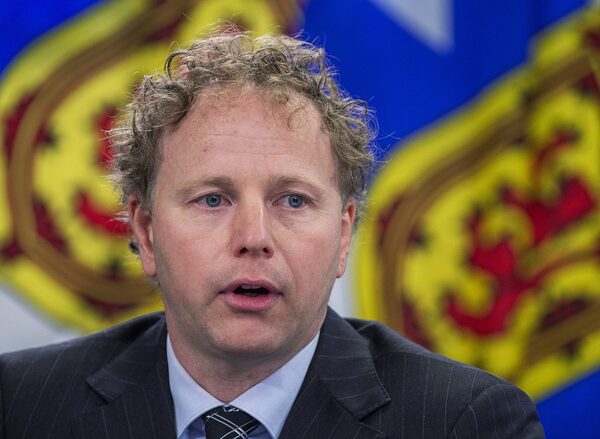
Nova Scotia Finance Minister Allan MacMaster, in Halifax, on Sept. 29, 2021.Andrew Vaughan/The Canadian Press
Nova Scotia’s Progressive Conservative government is forecasting a $506.2-million deficit in its first budget as it focuses on an election campaign pledge to spend heavily on the province’s ailing health system.
The $13.2-billion budget for the 2022-23 fiscal year tabled on Tuesday contains $5.7 billion for health care – an increase of $413.4 million compared to last year’s spending.
Finance Minister Allan MacMaster said in his budget address that he has presented an economic plan “for all the people and their families who waited for a doctor, a surgery, a nursing home room, a place to live.”
MacMaster told reporters he believes the health spending will be “transformational.”
“We hope that it is going to make a difference, that it will start to fix health care,” he said. “For a growing province, we need a good health-care system that’s functioning properly.”
The fiscal document contains the largest projected deficit since 2013-14. The red ink is just beginning, with the government estimating another $418-million deficit coming in 2023-24 and further deficits in the following two years.
The net debt of the province is projected to grow by $1.6 billion, to $18.4 billion, or just under 35 per cent of gross domestic product.
The increased spending for health includes $22.9 million to continue delivery of COVID-19 vaccines and $17.5 million to perform an additional 2,500 surgeries.
Long-term care is also getting millions to help increase staffing levels, including $66.3 million to boost the wages of continuing care assistants.
“In the case of continuing care assistants, we’ve given a 23 per cent (wage) increase, which will effectively mean a $9,000-a-year raise,” the finance minister told reporters.
The funding for retaining and attracting staff is aimed at reaching a new standard of at least 4.1 hours of one-on-one care for every long-term care resident.
In addition, over 40 per cent of the province’s record-setting $1.6-billion capital budget announced last Wednesday is being directed at health spending – with a major portion going to hospital redevelopment projects in Halifax and Sydney, N.S.
There is no increase for the income assistance rate in the budget, despite rising prices of food and other necessities.
That omission drew the attention of the Opposition Liberals and third-party NDP.
Liberal Leader Iain Rankin said he was “underwhelmed” by a budget that doesn’t contain cost of living measures for the poor at a time when many are struggling with higher bills.
“There’s nothing to help Nova Scotians at the (gas) pumps, at the grocery stores there’s lots of government programs that we want to see increased,” he said.
NDP Leader Gary Burrill said the lack of inflationary measures stands in contrast to other provinces like Quebec, British Columbia and New Brunswick, which did offer various forms of help.
However, MacMaster pointed to targeted funding of $12.5 million for the Nova Scotia child benefit program and to a previously announced $13-million program to assist low-income citizens with rising fuel prices.
Meanwhile, two tax measures aimed at about 27,000 non-resident property owners – including cottage owners who live outside the province – are projected to raise $81 million to help make housing more available in the province.
Effective April 1, a transfer tax of five per cent of the property’s value will be levied on non-residents of the province who buy a property and do not move to the province within six months of the closing date. In addition, property taxes of $2 per $100 of assessed value of residential properties owned by non-residents will be levied, though this won’t apply to buildings with more than three units or those rented to Nova Scotians year-round.
MacMaster said the tax is similar to one neighbouring Prince Edward Island has had for a number of years.
“It’s incredibly difficult to find housing, whether it’s affordable housing or even attainable housing so we’re hopeful this measure will help people who are struggling to find a place to live,” MacMaster said.
A growing scarcity of lower-cost housing has emerged as an issue in the province, as lower-income Nova Scotians have struggled to afford rising rents and the province’s population has topped one million people. The budget allocates $15 million for affordable housing programs and $2.7 million for new rent supplements.
The budget is also encouraging people under 30 to take up the skilled trades, with a commitment to provide personal income tax refunds for the first $50,000 earned by these workers. The program begins this year, and it’s anticipated to cost about $80 million in lost tax revenues in 2023-24.
The budget notes that the Russia-Ukraine conflict could pose “wide and significant” risks for its projections of economic growth of 2.1 per cent this year and 1.6 per cent in 2023.
Our Morning Update and Evening Update newsletters are written by Globe editors, giving you a concise summary of the day’s most important headlines. Sign up today.